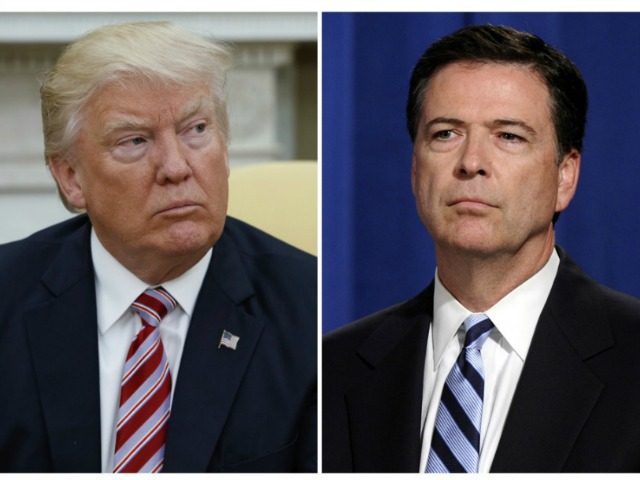President Trump was advised that firing James Comey would not end the FBI investigation into his campaign and potential collusion with Russia, but he decided to do so anyway, according to a report by the New York Times.
That new detail debunks what critics of Trump have been arguing — that Trump tried to end the investigation by firing Comey and was therefore obstructing justice.
In fact, Trump was not only told by the White House counsel Don McGahn that firing Comey would not end the investigation, but he also told McGahn he “understood that firing the F.B.I. director might extend the Russia investigation,” according to senior administration officials.
“Mr. McGahn met again that same day with Mr. Trump and told him that if he fired Mr. Comey, the Russia investigation would not go away. Mr. Trump told him, according to senior administration officials, that he understood that firing the F.B.I. director might extend the Russia investigation, but he wanted to do it anyway,” the report said.
The report also reveals that Jared Kushner and Stephen Miller had advised the president to fire Comey, during a weekend stay at the president’s golf course in Bedminster, New Jersey.
The Times also reported that the special counsel looking into Russian meddling and any possible collusion with the Trump campaign has obtained a letter that Trump drafted that weekend, with the help of Miller.
The letter contained Trump’s “unvarnished view” of why Comey should be fired. The Times said they did not view the letter themselves.
McGahn reportedly believed the letter was “angry” and “meandering,” and arranged for the president to meet with Attorney General Jeff Sessions and Deputy Attorney General Rod Rosenstein, who was already pursuing separate efforts to fire Comey.
Sessions and Rosenstein were “particularly angry” about testimony Comey had given to the Senate Judiciary Committee the week before.
“Mr. Comey’s conduct during the hearing added to concerns of Mr. Sessions and Mr. Rosenstein that the F.B.I. director had botched the Clinton investigation and had overstepped the boundaries of his job. Shortly after that hearing, Mr. Rosenstein had expressed his concerns about Mr. Comey to a White House lawyer, who relayed details of the conversation to his bosses at the White House,” the report said.
Rosenstein then drafted his own letter, which was used as the public rationale for Comey’s firing, which said Comey mishandled the investigation into Hillary Clinton’s private email server.
The Times does not report the actual contents of Trump’s initial letter, but notes that Trump was angry that Comey had told him privately three times that he was not under FBI investigation but refused to acknowledge it publicly, letting it linger over his administration.
Comey confirmed later that he did tell the president that three times, but said he didn’t want to make that public since it could set a precedent where he would have to tell the public if that changed.
The report also reveals it was Rosenstein who pared down Trump’s original letter to a “simpler rationale” — that Comey should be dismissed over his handling of the Clinton investigation.
Media outlets have accused the White House of giving different explanations of why Comey was fired, but the letter — versus what Trump said in interviews later — could account for the difference in explanations.
“Unlike Mr. Trump’s letter, it made no mention of the times Mr. Comey had told the president he was not under investigation,” the report said.
Trump did, however, manage to get into the letter that Comey had told him three times that he was not under investigation.
Despite Trump knowing that firing Comey would not end the investigation, and despite Sessions and Rosenstein wanting to fire Comey also, and Kushner and Miller advising him to, Mueller decided to look into potential obstruction of justice.
Earlier this week, the Wall Street Journal reported that Trump’s lawyers argued in two memos that the president did not obstruct justice – as it was in his authority to fire Comey – and that Comey was prone to exaggeration.

COMMENTS
Please let us know if you're having issues with commenting.